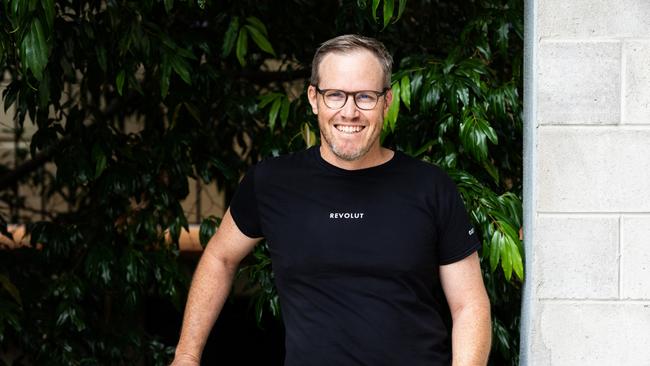This bank will blow a hole in the side of the ‘big four’ but you have probably never heard of it
In Europe, to ‘rev’ money has become as ubiquitous among the under-35s as to ‘google’ information and Revolut, the global neo-bank, is close to getting an Australian bank licence.

Business
Don't miss out on the headlines from Business. Followed categories will be added to My News.
You might think a new entrant could never break the grip of the major banks.
But actually, the breakthrough is closer than you think, and it’s going to be on your mobile phone.
Just like Uber decimated the taxi industry or streaming “disrupted” commercial television, it takes a “blue ocean” strategy – the creation of uncontested market space – to up-end a powerful industry.
In banking, the most potent disruptive model is coming from a group called ‘Revolut’ and it has just moved a step closer to getting an Australian banking licence.
Keep in mind that Revolut has done this in a banking market which is nothing short of a graveyard for any company which tries to break the oligopoly of the “big four”.
Only a few days ago the latest in a sorry line of Australian “neo-banks” effectively packed it in. The banking regulator APRA (Australian Prudential Regulation Authority) announced it had revoked the licence of the International Bank of Australia. It’s unlikely you ever heard of IBOA because it never even got to test its plans.
It must be depressing for all concerned as one neo-bank after another returns their licence – akin to mortgages surrendering their properties back to the bank. Remember Xinja Bank or Volt Bank? They have bit the dust too.
But this time it’s going to be different because Revolut looks very like the neo-bank that has cracked the formula.

It’s just got a banking licence in the UK which means an Australian licence now looks like a sure thing. Yet even before this inevitable milestone, Revolut is making serious inroads in the local market; it’s signed up 720,000 customers already in Australia and has transaction volumes annualised at an estimated $1bn.
Overseas, the story is phenomenal. It’s the “new, new thing” in banking leaving both industry analysts gobsmacked and an estimated 45 million customers happier than they were with the old banking players.
Revolut’s big chief, 40-year-old Russian-born Nikolay Stornosky, says he aims for the group to become the “Amazon of banking”.
How does it work? It began as a card service competing with operators like Western Union and quickly built up an overseas network of customers who found it faster and cheaper than traditional banks.
Founded and headquartered in London, Its big breakthrough came when it got an EU licence. More recently, the Bank of England licence confirmed its status as a fully fledged financial juggernaut and it can now do everything from mortgages to deposits.
And it does it very cheaply with virtually no legacy systems, not to mention bank branches.
Of course it’s not perfect. It’s a bank with no branches, it’s a tech creation that sits on top of the existing system and could not have existed otherwise.
It has been widely reported that regulators have found it challenging to fully understand the group’s finances and its financial projections. It took three years to get that UK bank licence, whereas they are usually granted within 12 months.
I recently used Revolut around Europe, watching money transfer from Australian banks through Apple Pay into Euro in seconds – it was accepted everywhere. The exchange rates were better than any other service.
But the outstanding feature was a security feature. It offers a once-off card number for any payment.
As a traveller, your biggest fear is that you inadvertently hand your card number over to a fraudulent operation and once they have your card you are in big trouble. Revolut’s “disposable card” regenerates your number after each use: Problem solved.
These are practical advantages, but it was only when I got to Ireland and heard younger people telling each other they would “rev” money to each other when splitting meal bills in restaurants I realised the reach of this service. It’s become a verb like “to google”.
It is estimated the majority of Revolut customers around the world are under the age of 35 and history suggests that if you get bank customers when they are younger, they remain customers for life.
So can it crack fortress Australia?
“We are going to take it to the banks, we have the incumbents in our sights’ says Matt Baxby, the chief executive of Revolut’s Australian operations which are growing rapidly.
Baxby won’t reveal all plans, even on his expectations about when it will get a licence but he says the group aims for best-in-class products.
According to Baxby, Revolut in Australia is growing at 100 per cent a year, and that’s with a low public profile and without the government guarantee that comes with a banking licence.
But Revolut will move quickly to compete in the spots our local banking industry has left wide open. Where will it start? Consumer credit, depot taking, unsecured debt services?
As a shareholder in Australian bank stocks this is a threat. Just now it’s often money for jam at the big banks – mature operations are simply being priced higher and higher by local investors. How else can you explain Commonwealth Bank’s record share price on a mundane outlook?
Revolut is currently estimated to be worth about $45bn off the back of a recent share sell down, making it about one fifth the size of CBA.
But then again three years ago it was an obscure Lithuanian fintech and it’s taken a century for any Australian bank to get to this level of scale.
For bank customers this is promising; this is one neo-bank which won’t be giving its licence back to APRA. It’s going to blow a hole in the side of the Australian banking industry and the sooner the better.
James Kirby presents the twice-weekly Money Puzzle podcast
More Coverage
Originally published as This bank will blow a hole in the side of the ‘big four’ but you have probably never heard of it




